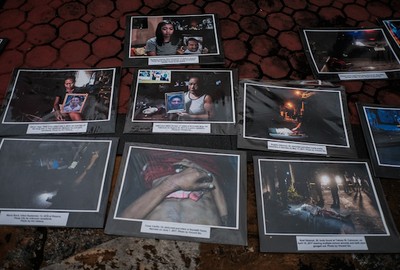Families of the fallen fight back in Philippine drug war
September 12, 2017 · By www.ucanindia.in

Manila: Marian, a 25-year-old mother from Navotas City wept in the rain as she begged Filipinos to challenge the government’s claim that the thousands killed in Philippine President Rodrigo Duterte’s war on drugs deserved their deaths.
A sister and daughter of men slain in anti-narcotics operations in July 2016, Marian was also kept for days in a secret Manila detention cell by police who demanded money for her freedom.
She has been in hiding for months but came out after television news showed video footage of police executing 17-year-old Kian de los Santos on Aug. 16.
“I can feel my father is being killed repeatedly with all these killings. I can see my father in all of these victims,” Marian said at a protest where streamers demanded “Justice for Kian, Justice for All.”
The death of Kian, son of an overseas worker, has galvanized Filipinos weary of the rising death toll in Duterte’s campaign.
Human rights groups say more than 12,000 have been killed, though police only claim a third of that number have died.
‘Intentional killing’
On Aug. 21, neighbors of Kian in Caloocan City howled with hundreds of visitors as results of an autopsy on Kian were announced.
Forensic experts at the Public Attorney’s Office said Kian had gunshot wounds in the back, in the head and his left ear. The wounds indicate “intentional killing,” Doctor Erwin Erfe told reporters.
The two-kilometer march from a parish church to the alleys of Kian’s neighborhood stopped by the local police precinct.
“There is no forever to your impunity,” former lawmaker Neri Colmenares warned grim-faced law enforcers, urging them to “resist illegal orders.”
As hundreds gathered that night to continue protests on the capital’s main highway, the president ended days of silence.
Duterte told reporters police should go to jail if they are found guilty of a “rubout” in Kian’s case.
He stopped short of condemning the police.
“I would be the last person to condemn them without a valid investigation; I am their commander in chief,” he said.
Sanctuaries
Rights groups are struggling to help grieving families muster the will for a long fight.
On Aug. 22, as the Senate opened a probe into drug war fatalities, priests and lawyers urged the creation of more sanctuaries.
“We need our witnesses alive,” said Krissy Conti of the National Union of People’s Lawyers, told ucanews.com. The group handles cases of suspected police executions and another involving a minor who survived a shooting that killed three of his friends.
Every fight for justice involves several members of a family, sometimes entire clans, according to Father Gilbert Billena of the Order of Carmelites and parish priest in a slum where 39 residents have been killed.
Father Billena is a convenor of the multi-faith group Rise Up, which has established a few sanctuaries.
The act of witnessing is major step that could include uprooting breadwinners from places of work and disrupting children’s studies, he said.
Marian told ucanews.com that her family struggled to find the courage to pursue justice for her father, killed in a “buy-bust operation” and older brother, who was arrested in the same incident and later found dead.
“Police said they needed my brother for questioning,” Marian said.
Later that day, while identifying her father at a morgue, she discovered her brother on a stainless steel counter, beside the family patriarch.
Police refused to answer questions, closing the cases as part of “successful anti illegal drugs operations.”
Extreme poverty kept the family silent, Marian said.
But the nightmare did not end. In March this year, police arrested Marian and put her in “a secret jail” in Manila’s rough Tondo district.
They accused Marian of selling drugs but did not formally charge her. Instead, they demanded $800 for her freedom.
It took four days and the sale of the family shanty to raise the money.
A month later, the Commission on Human Rights inspected Manila District Police Station 1, where Marian was detained. The team found a dozen people in a small, dark, stuffy cell hidden behind a bookshelf.
Police denied the charge of illegal detention. They claimed overcrowded jails forced them to create the “temporary” cell.
War against the poor
Like many survivors, Marian fears for the lives of relatives.
That fear ebbed as she watched reports of close to a hundred people slain in barely two days of police operations last week. Duterte had crowed over the killings. If it continued on that level, the country’s drug problem could be solved, he said.
Kian’s death was the last straw for Marian.
“I am alive. The least I can do is speak for the dead,” she said.
Filipinos need to “stand against the culture of death and rise up with the victims of impunity,” said Nardy Sabino of the Promotion of Church People’s Response.
“It is not safe in the streets anymore. Anyone could be a drug offender and be killed without due process of law,” he warned.
For Marian, justice is no longer a dream kept in her heart. She vows to tell her story over and over “until eyes are opened and justice prevails.”
“Every time a person is killed, my father is being killed. I will speak up for every person whose rights are violated,” she said.






